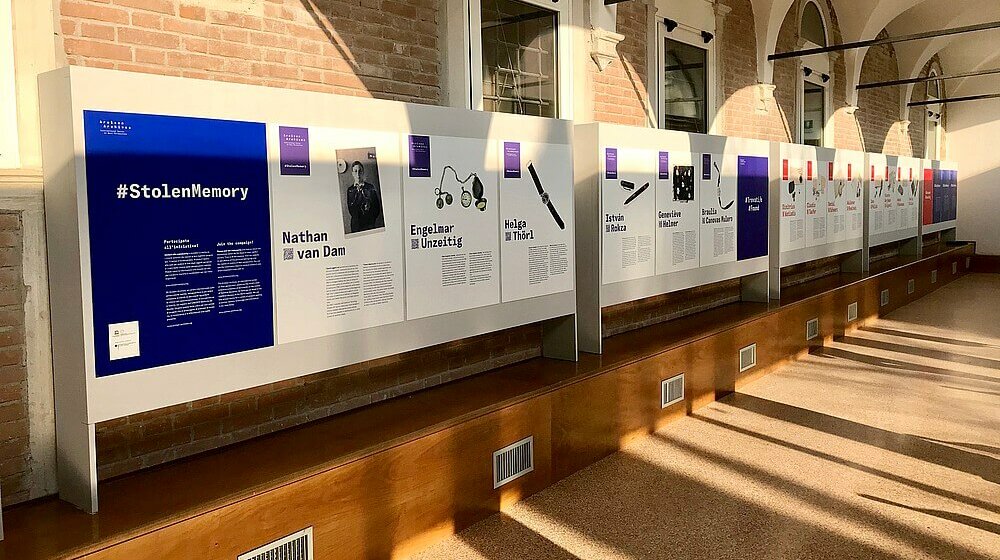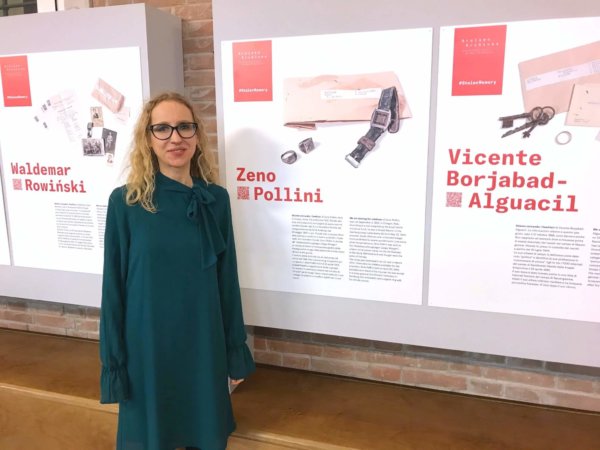"Students, academics, and the public can actively participate in #StolenMemory."

The first #StolenMemory poster exhibition to be shown in Italy opened on January 10th and can be seen at the Ca’ Foscari University in Venice until February 7th. It is the focus of a series of conferences, seminars, and readings organized in connection with International Holocaust Remembrance Day at Ca’ Foscari. Sara De Vido, Professor of International Law and initiator of the events, explains why it was so important to her to show #StolenMemory in Venice.
Sara, you brought the #StolenMemory poster exhibition to Italy. How did this idea come about?
I myself made an inquiry to the Arolsen Archives. I was researching my grandpa’s past. He was imprisoned in Germany during the war, after returning from the Russian front where he was wounded. He was captured at the border and deported, subjected to forced labor and was not able to come back to his home in a small town in the North East of Italy until the situation came to a head in 1945. One day, there he was again, sitting in the garden in front of his house, extremely thin, exhausted. His family had thought he was dead. He survived and built his life on solid principles. He has always remembered some words of German. No reparation was ever granted to him. The Arolsen Archives sent copies of documents to me which demonstrate that he was in Stalag IB from 1943 to 1945.
And you came across the #StolenMemory project during your research?
When consulting the amazing website of the Arolsen Archives, I found the #StolenMemory exhibition, and I thought it was perfect for Ca’ Foscari. Our students can understand the importance of remembering what happened during the second WW through the objects shown here. What strikes them most is the fact that these objects were part of people’s everyday lives. Lives that were often completely destroyed, annihilated. And these objects were what these people had with them when they escaped or when they were caught: a watch, a photo, school reports. And one cannot help but reflect on the persecution of those days.
»The #Stolen Memory exhibition is very powerful and moving because of how effectively it conveys the tragedy of the day-to-day life in concentration camps. The value of memory is priceless, more so today as we see racism and hate emerge again.«
Prof. Michele Bugliesi, Rector of Ca’ Foscari University
Are you of the opinion that exhibitions of this kind can offer younger generations in particular an approach to dealing with NS persecution?
Yes, absolutely. We must preserve the memory. It can help young people to reflect, ask questions, take nothing for granted. Antisemitism and hate based on religion and ethnicity are back, and they can never be “normalized” or justified. All forms of discrimination must be condemned and rejected. The development of human rights law after WWII has been fundamental, but it is not enough without remembering. This is why I am extremely grateful to the Arolsen Archives to have helped us to put on this extraordinary exhibition, which has already received positive feedback.
What feedback has there been so far?
Firstly, we had about 100 participants at the opening conference of the exhibition. The conference was attended by the Arolsen Archives, Paolo Gnignati, President of the Jewish Community in Venice, Michele Bugliesi, Rector of our University, and Luisella Pavan-Woolfe, Director of the Council of Europe Office in Venice. There was a lot of media coverage, even a report on RAI national television, which was broadcast throughout Italy. We are very pleased that the exhibition has had such an impact.

Sara De Vido in front of the poster of Zeno Pollini, one of the Italian fates shown in the #StolenMemory exhibition in Venice.
Your students were very involved in the project and helped a lot with the preparations. What exactly did their contribution look like?
21 students started preparing the work in October, doing translations mainly, but also conducting some research on the topic. They prepared the brochures to promote the events and, along with IVESER, the center for “resistenza” in Venice, the three posters on Italian concentration camps too. We have a month long program, during which students participate in workshops and conferences. Tomorrow, we are interviewing a former Italian military internee. He turns 100 this year! We will also prepare a film. However, a large part of the students’ work is to do the guided tours: we are receiving requests every day. On International Holocaust Remembrance Day, we have 8 classes coming from different cities.
It is a great success for all of us. The students are doing an amazing job!

